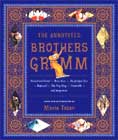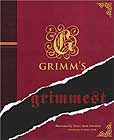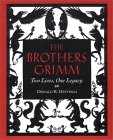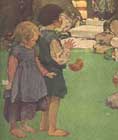

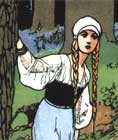
Author's Notes
translated by Margaret Hunt
Return
to
Household Tales:
Table of Contents
Previous
Tale:
The Wolf and the Seven Young Kids
SurLaLune Fairy Tales Main Page
Faithful
John
THERE was once on a time an old king
who was ill, and thought to himself, "I am lying on what must be
my death-bed." Then said he, " Tell Faithful John to come to
me." Faithful John was his favourite servant, and was so called,
because he had for his whole life long been so true to him. When therefore
he came beside the bed, the King said to him, "Most faithful John,
I feel my end approaching, and have no anxiety except about my son. He
is still of tender age, and cannot always know how to guide himself. If
thou dost not promise me to teach him everything that he ought to know,
and to be his foster-father, I cannot close my eyes in peace." Then
answered Faithful John, "I will not forsake him, and will serve him
with fidelity, even if it should cost me my life." On this, the old
King said, "Now I die in comfort and peace." Then he added,
"After my death, thou shalt show him the whole castle: all the chambers,
halls, and vaults, and all the treasures which lie therein, but the last
chamber in the long gallery, in which is the picture of the princess of
the Golden Dwelling, shalt thou not show. If he sees that picture, he
will fall violently in love with her, and will drop down in a swoon, and
go through great danger for her sake, therefore thou must preserve him
from that." And when Faithful John had once more given his promise
to the old King about this, the King said no more, but laid his head on
his pillow, and died.
When the old King had been carried to his grave, Faithful John told the young King all that he had promised his father on his deathbed, and said, "This will I assuredly perform, and will be faithful to thee as I have been faithful to him, even if it should cost me my life." When the mourning was over, Faithful John said to him, "It is now time that thou shouldst see thine inheritance. I will show thee thy father's palace." Then he took him about everywhere, up and down, and let him see all the riches, and the magnificent apartments, only there was one room which he did not open, that in which hung the dangerous picture. The picture was, however, so placed that when the door was opened you looked straight on it, and it was so admirably painted that it seemed to breathe and live, and there was nothing more charming or more beautiful in the whole world. The young King, however, plainly remarked that Faithful John always walked past this one door, and said, "Why dost thou never open this one for me?" "There is something within it," he replied, "which would terrify thee." But the King answered, "I have seen all the palace, and I will know what is in this room also," and he went and tried to break open the door by force. Then Faithful John held him back and said, "I promised thy father before his death that thou shouldst not see that which is in this chamber, it might bring the greatest misfortune on thee and on me." "Ah, no," replied the young King, "if I do not go in, it will be my certain destruction. I should have no rest day or night until I had seen it with my own eyes. I shall not leave the place now until thou hast unlocked the door."
Then Faithful John saw that there was no help for it now, and with a heavy heart and many sighs, sought out the key from the great bunch. When he had opened the door, he went in first, and thought by standing before him he could hide the portrait so that the King should not see it in front of him, but what availed that? The King stood on tip-toe and saw it over his shoulder. And when he saw the portrait of the maiden, which was so magnificent and shone with gold and precious stones, he fell fainting to the ground. Faithful John took him up, carried him to his bed, and sorrowfully thought, "The misfortune has befallen us, Lord God, what will be the end of it?" Then he strengthened him with wine, until he came to himself again. The first words the King said were, "Ah, the beautiful portrait! whose it it?" "That is the princess of the Golden Dwelling," answered Faithful John. Then the King continued, "My love for her is so great, that if all the leaves on all the trees were tongues, they could not declare it. I will give my life to win her. Thou art my most Faithful John, thou must help me."
The faithful servant considered within himself for a long time how to set about the matter, for it was difficult even to obtain a sight of the King's daughter. At length he thought of a way, and said to the King, "Everything which she has about her is of gold -- tables, chairs, dishes, glasses, bowls, and household furniture. Among thy treasures are five tons of gold; let one of the goldsmiths of the Kingdom work these up into all manner of vessels and utensils, into all kinds of birds, wild beasts and strange animals, such as may please her, and we will go there with them and try our luck."
The King ordered all the goldsmiths to be brought to him, and they had to work night and day until at last the most splendid things were prepared. When everything was stowed on board a ship, Faithful John put on the dress of a merchant, and the King was forced to do the same in order to make himself quite unrecognizable. Then they sailed across the sea, and sailed on until they came to the town wherein dwelt the princess of the Golden Dwelling.
Faithful John bade the King stay behind on the ship, and wait for him. "Perhaps I shall bring the princess with me," said he, "therefore see that everything is in order; have the golden vessels set out and the whole ship decorated." Then he gathered together in his apron all kinds of gold things, went on shore and walked straight to the royal palace. When he entered the courtyard of the palace, a beautiful girl was standing there by the well with two golden buckets in her hand, drawing water with them. And when she was just turning round to carry away the sparkling water she saw the stranger, and asked who he was. So he answered, "I am a merchant," and opened his apron, and let her look in. Then she cried, "Oh, what beautiful gold things!" and put her pails down and looked at the golden wares one after the other. Then said the girl, "The princess must see these, she has such great pleasure in golden things, that she will buy all you have." She took him by the hand and led him upstairs, for she was the waiting-maid. When the King's daughter saw the wares, she was quite delighted and said, "They are so beautifully worked, that I will buy them all of thee." But Faithful John said, "I am only the servant of a rich merchant. The things I have here are not to be compared with those my master has in his ship. They are the most beautiful and valuable things that have ever been made in gold." She wanted to have everything brought to her there, but he said, "There are so many of them that it would take a great many days to do that, and so many rooms would be required to exhibit them, that your house is not big enough." Then her curiosity and longing were still more excited, until at last she said, "Conduct me to the ship, I will go there myself, and behold the treasures of thine master."
On this Faithful John was quite delighted, and led her to the ship, and when the King saw her, he perceived that her beauty was even greater than the picture had represented it to be, and thought no other than that his heart would burst in twain. Then she got into the ship, and the King led her within. Faithful John, however, remained behind with the pilot, and ordered the ship to be pushed off, saying, "Set all sail, till it fly like a bird in air." Within, however, the King showed her the golden vessels, every one of them, also the wild beasts and strange animals. Many hours went by whilst she was seeing everything, and in her delight she did not observe that the ship was sailing away. After she had looked at the last, she thanked the merchant and wanted to go home, but when she came to the side of the ship, she saw that it was on the deep sea far from land, and hurrying onwards with all sail set. "Ah," cried she in her alarm, "I am betrayed! I am carried away and have fallen into the power of a merchant -- I would die rather!" The King, however, seized her hand, and said, "I am not a merchant. I am a king, and of no meaner origin than thou art, and if I have carried thee away with subtlety, that has come to pass because of my exceeding great love for thee. The first time that I looked on thy portrait, I fell fainting to the ground." When the princess of the Golden Dwelling heard that, she was comforted, and her heart was inclined unto him, so that she willingly consented to be his wife.
It so happened, however, while they were sailing onwards over the deep sea, that Faithful John, who was sitting on the fore part of the vessel, making music, saw three ravens in the air, which came flying towards them. On this he stopped playing and listened to what they were saying to each other, for that he well understood. One cried, "Oh, there he is carrying home the princess of the Golden Dwelling." "Yes," replied the second, "but he has not got her yet." Said the third, "But he has got her, she is sitting beside him in the ship." Then the first began again, and cried, "What good will that do him? When they reach land a chestnut horse will leap forward to meet him, and the prince will want to mount it, but if he does that, it will run away with him, and rise up into the air with him, and he will never see his maiden more." Spake the second, "But is there no escape?"
"Oh, yes, if any one else gets on it swiftly, and takes out the pistol which must be in its holster, and shoots the horse dead with it, the young King is saved. But who knows that? And whosoever does know it, and tells it to him, will be turned to stone from the toe to the knee." Then said the second, "I know more than that; even if the horse be killed, the young King will still not keep his bride. When they go into the castle together, a wrought bridal garment will be lying there in a dish, and looking as if it were woven of gold and silver; it is, however, nothing but sulphur and pitch, and if he put it on, it will burn him to the very bone and marrow." Said the third, "Is there no escape at all?"
"Oh, yes," replied the second, "if any one with gloves on seizes the garment and throws it into the fire and burns it, the young King will be saved. "But what avails that?" Whosoever knows it and tells it to him, half his body will become stone from the knee to the heart."
Then said the third, "I know still more; even if the bridal garment be burnt, the young King will still not have his bride. After the wedding, when the dancing begins and the young queen is dancing, she will suddenly turn pale and fall down as if dead, and if some one does not lift her up and draw three drops of blood from her right breast and spit them out again, she will die. But if any one who knows that were to declare it, he would become stone from the crown of his head to the sole of his foot." When the ravens had spoken of this together, they flew onwards, and Faithful John had well understood everything, but from that time forth he became quiet and sad, for if he concealed what he had heard from his master, the latter would be unfortunate, and if he discovered it to him, he himself must sacrifice his life. At length, however, he said to himself, "I will save my master, even if it bring destruction on myself."
When therefore they came to shore, all happened as had been foretold by the ravens, and a magnificent chestnut horse sprang forward. "Good," said the King, "he shall carry me to my palace," and was about to mount it when Faithful John got before him, jumped quickly on it, drew the pistol out of the holster, and shot the horse. Then the other attendants of the King, who after all were not very fond of Faithful John, cried, "How shameful to kill the beautiful animal, that was to have carried the King to his palace." But the King said, "Hold your peace and leave him alone, he is my most faithful John, who knows what may be the good of that!" They went into the palace, and in the hall there stood a dish, and therein lay the bridal garment looking no otherwise than as if it were made of gold and silver. The young King went towards it and was about to take hold of it, but Faithful John pushed him away, seized it with gloves on, carried it quickly to the fire and burnt it. The other attendants again began to murmur, and said, "Behold, now he is even burning the King's bridal garment!" But the young King said, "Who knows what good he may have done, leave him alone, he is my most faithful John."
And now the wedding was solemnized: the dance began, and the bride also took part in it; then Faithful John was watchful and looked into her face, and suddenly she turned pale and fell to the ground, as if she were dead. On this he ran hastily to her, lifted her up and bore her into a chamber -- then he laid her down, and knelt and sucked the three drops of blood from her right breast, and spat them out. Immediately she breathed again and recovered herself, but the young King had seen this, and being ignorant why Faithful John had done it, was angry and cried, "Throw him into a dungeon." Next morning Faithful John was condemned, and led to the gallows, and when he stood on high, and was about to be executed, he said, "Every one who has to die is permitted before his end to make one last speech; may I too claim the right?" "Yes," answered the King, "it shall be granted unto thee." Then said Faithful John, "I am unjustly condemned, and have always been true to thee," and he related how he had hearkened to the conversation of the ravens when on the sea, and how he had been obliged to do all these things in order to save his master. Then cried the King, "Oh, my most Faithful John. Pardon, pardon -- bring him down." But as Faithful John spoke the last word he had fallen down lifeless and become a stone.
Thereupon the King and the Queen suffered great anguish, and the King said, "Ah, how ill I have requited great fidelity!" and ordered the stone figure to be taken up and placed in his bedroom beside his bed. And as often as he looked on it he wept and said, "Ah, if I could bring thee to life again, my most faithful John." Some time passed and the Queen bore twins, two sons who grew fast and were her delight. Once when the Queen was at church and the two children were sitting playing beside their father, the latter full of grief again looked at the stone figure, sighed and said, "Ah, if I could but bring thee to life again, my most faithful John." Then the stone began to speak and said, "Thou canst bring me to life again if thou wilt use for that purpose what is dearest to thee." Then cried the King, "I will give everything I have in the world for thee." The stone continued, "If thou wilt will cut off the heads of thy two children with thine own hand, and sprinkle me with their blood, I shall be restored to life."
The King was terrified when he heard that he himself must kill his dearest children, but he thought of faithful John's great fidelity, and how he had died for him, drew his sword, and with his own hand cut off the children's heads. And when he had smeared the stone with their blood, life returned to it, and Faithful John stood once more safe and healthy before him. He said to the King, "Thy truth shall not go unrewarded," and took the heads of the children, put them on again, and rubbed the wounds with their blood, on which they became whole again immediately, and jumped about, and went on playing as if nothing had happened. Then the King was full of joy, and when he saw the Queen coming he hid Faithful John and the two children in a great cupboard. When she entered, he said to her, "Hast thou been praying in the church?" "Yes," answered she, "but I have constantly been thinking of Faithful John and what misfortune has befallen him through us." Then said he, "Dear wife, we can give him his life again, but it will cost us our two little sons, whom we must sacrifice." The Queen turned pale, and her heart was full of terror, but she said, "We owe it to him, for his great fidelity." Then the King was rejoiced that she thought as he had thought, and went and opened the cupboard, and brought forth Faithful John and the children, and said, "God be praised, he is delivered, and we have our little sons again also," and told her how everything had occurred. Then they dwelt together in much happiness until their death.
Grimm, Jacob and Wilhelm. Household Tales. Margaret Hunt, translator. London: George Bell, 1884, 1892. 2 volumes.
Notes
From Zwehrn. There is another story from the Paderborn district. At the bidding of an old woman, a poor peasant invites the first person whom he meets on the road, who is a stranger to him, to stand as godfather. It so happens that this is the King, who therefore holds the child at the christening, and gives him the name of Roland. The Queen has been confined at the same time, and her child called Joseph. When a year has passed by, the King sends for the little Roland, and adopts him as his child. Roland and Joseph grow together, and look on each other as brothers. When they are twenty years of age, the King one day rides away and leaves them the keys of all the rooms, all of which they may open but one. Roland, however, is so curious that on the third day he persuades Joseph to go into the forbidden room with him. It is entirely hung with cloth, but when Roland lifts this up he beholds the portrait of a wonderfully beautiful maiden, and faints at the sight; Joseph carries him out. Roland is restored to consciousness, but from that hour is sick with love, and knows no rest until they both go to the kingdom where the King's daughter lives. She is shut up in a tower for seven years. In the evening she is taken in a closed carriage to her parents, and early in the morning before daybreak back again to the tower. Roland and Joseph cannot see her even once, and have to go home as they came. Then their father gives them four ships; three furnished with cannon, and one with the most beautiful wares. They sail thither, and give out that they are merchants, and Joseph begs the King to make a law that only one person at a time may go on board his ship, as it would otherwise be too much crowded. This is done, and now the King himself comes on board the ship, and after him the Queen, and they buy largely. And as all the things are so beautiful, their daughter is to see them too. But no sooner has she stepped on board than the anchor is raised, and the lovely bride carried away. The King sends a ship to bring her back again, but that is sunk by the cannon. During the voyage Joseph is one night on the watch, and hears a murmuring, and a voice which cries, "Do you know any news?" "News enough," answers another, "the King's beautiful daughter is stolen away, and is here in this ship; but whosoever intends to have her for his wife must first find some one who will cut the black horse's head off." This alarms Joseph, and the next night, when Roland is going to keep watch, Joseph begs him to sleep instead, and give up the watch to him. Then he again hears the voices. "Do you know any news?" "News enough; the King's daughter is stolen away, and is shut up here in the ship; but whosoever intends to have her to wife, can only succeed if any one can be found who, when the bridegroom is drinking the bride's health, will strike away the glass from his lips so that the fragments fly round about. He, however, who speaks of this will be turned into stone to the height of his heart." Joseph is on the watch on the third night also, and then he hears, "The bridegroom cannot obtain the bride unless some one can be found to cut off the seven heads of the dragon which will be thrust in through the window on the night of the marriage. He, however, who speaks of this will be stone to his head." On the following day they arrive; the King comes to meet them with his people, and brings with him a white horse for Joseph, and a black one for Roland. Joseph mounts his, and cuts the black one's head off. All are astonished and excited, and ask the cause, but he replies, "I may and dare not tell you." In the same way also at the wedding-feast, when Roland is about to drink his bride's health, Joseph strikes the glass away from his lips so that the fragments fly about. At last at night when Roland and his bride are already asleep, Joseph walks with his drawn sword backwards and forwards in the room before the window. Suddenly something begins to roar and bellow, and a dragon thrusts in his seven heads. He cuts them off at one blow, and the blood spirts into the room and fills his boots. The watch hearing the noise, summon the King, who comes, and when he opens the door the blood streams out to meet him, and he sees Joseph with drawn sword. "Alas, what hast thou done, my son?" he cries. Then Joseph cannot do otherwise than tell him all, and is immediately encased in stone, so that no one can see anything of him but his head, which seems to be asleep. In the course of a year the young Queen brings a son into the world, and then she dreams on three successive nights that if Joseph is smeared with the blood of the child he will be set free. She relates her dream to Roland, who summons together all the counsellors of the kingdom, who say that indeed he must sacrifice his child for the sake of his friend. So the child is christened, and then its head is cut off. Joseph is smeared with the blood of the child, the stone disappears forthwith, and he stands up and says, "Alas, dear brother, why hast thou awakened me? I have slept so sweetly." They tell him all that has passed, and then Joseph says, "Now I must help thee once more," and ties up the dead child in a linen cloth, and goes away with him. When he has already wandered about for three-quarters of a year, and troubled at heart that he can find no help, seats himself beneath a tree, an aged man comes and gives him two small bottles wherein are the water of life, and the water of beauty. Joseph now carries the child home, but is forced to beg, as he has nothing left. After a quarter of a year, he reaches his father's castle, and then he sits down on the bridge and rubs the child first with the water of life, which restores it to life, and then with the water of beauty, which makes it more fresh and beautiful than all others. Thereupon he takes it to its parents, who rejoice over it with all their hearts. There is a third variant in Wolf's Hausmarchen, p. 383.
It is evidently the saga of the faithful friends, Amicus and Amelius. The one while appearing to wrong the other, in reality gives his life for him; on the other hand, the latter sacrifices his own children in order to bring his friend back to existence, though, by a miracle, these are preserved. The counterpart of the voluntary sacrifice of a pure virgin's life (in Der arme Heinrich) is to be found in the story of Hildebrand, the faithful master of Dieterich; and the story of the Child Oney may be said to form a connecting link between them. Compare The Two Brothers (No. 60), Der arme Heinrich, p. 187, and following, and further indications in Athis, p. 46. The fate which in Hartmann's poem is announced by the physician, is here declared by the ravens-birds of destiny. The bridal-shirt (1) (a woven one, as it is called, in the language of the people, in contradistinction to one which is cut out) which consumes with fire whosoever puts it on, resembles the garment which Dejanira sends to Hercules, and Medea to Glauce. In our story it has apparently so happened that a witch for some reason or other desires to destroy the young King. In the corresponding, but still very individual Italian story (Pentam. iv. 9), it is probably the father of the stolen bride who sends misfortune after them by his curses. A Russian story in Dieterich, p. 38, should be compared, and the Negro story in Kölle (see further on).
A ship is similarly equipped, in the poem of Gudrun (1060 and following) on the voyage when Horand has to fetch Hilda.
1: A shirt without seams is probably what is meant. Such garments play a large part for good or for evil, in mythology. When Ragnar Lodbrog went on his last expedition to England, Aslanga his wife, who foreboded evil, gave him a shirt she had woven of fine grey silk in which no stitch had been put. He wore it instead of armour, and none could wound him, though at length he was captured. Finally, he was thrown into a pit full of snakes, none of which would touch him till the shirt was removed. See Ragnar Lodbrog's Saga, 16th chapter.-TR.
©Heidi
Anne Heiner, SurLaLune Fairy Tales
E-mail: surlalune@aol.com
Page last updated October 15, 2006
www.surlalunefairytales.com




